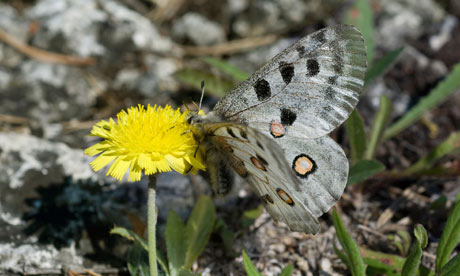Swedish environmentalists take wing against proposed new mine
Published by MAC on 2012-09-18Source: Guardian
Swedish environmental groups have appealed to the country's Supreme Court in a last-ditch attempt to halt quarrying of an ancient biodiverse habitat on Gotland island.
The government's own Environmental Protection Agency claims that, if mining were permitted, it would jeopardise "species and habitats...that are not present anywhere else in Sweden, and in some cases not on the entire planet".
These include the large blue butterfly and Montagu's harrier bird of prey.
If the Supreme Court this week agrees to hear the appeal, it could take months before a verdict is reached, during which the project is likely to be put on hold.
Battle over mining in ancient forest goes to Sweden's highest court
Environmentalists warn judges that damaging precedent will be set if large-scale limestone mining is permitted in Ojnare forest
Sylvia Rowley
Guardian (UK)
17 September 2012
A landmark case that could affect the fate of forests across Sweden reaches its final stage today in the supreme court.
 |
| A butterfly on a Gaffelfibbla (Pilosella dichotoma) Photograph: Rasmus Holmboe Dahl/Alamy |
Environmentalists have warned that a damaging precedent will be set if Finnish company Nordkalk is allowed to carry out large-scale limestone mining in an ancient, biodiverse habitat on the northern Swedish island of Gotland.
The planned limestone quarry would destroy part of Ojnare forest and neighbouring wetlands, a region that borders two protected areas and is so valuable that the Swedish Environmental Protection Agency (EPA) plans to turn it into a national park.
"We have species and habitats here that are not present anywhere else in Sweden, and in some cases not on the entire planet," says Nils Hallberg, a lawyer at the agency. Protected animals in the area include the large blue butterfly and Montagu's harrier, a bird of prey.
Environmental groups have appealed to the supreme court in a last-ditch attempt to halt the mining after Nordkalk was given the go-ahead by a lower Swedish court in July this year.
Supreme court judges will be presented with evidence from both sides today, and must decide over the coming days whether to take on the case.
Tensions have run high in recent weeks, with activists chaining themselves to machinery to stop trees being felled, and protests including candle-lit vigils held in nine Swedish cities. "People are very upset," said Elisabeth Wanneby, a member of campaign group Save Ojnare Forest.
The main legal criticism in this case, that has been contested since 2006, focuses on the impact of the four kilometre-long and 25 metre-deep quarry on two nearby "Natura 2000" EU-protected areas, that are designed to safeguard Europe's most valuable species and habitats.
"We do not think that Nordkalk has presented enough scientific evidence that these protected areas will not be harmed by the work," said Hallberg.
Environmental groups are concerned that mining could pollute and deplete the groundwater system that runs between the two nature reserves directly under the proposed quarry.
They also fear for the area's unique wildlife. More than half of the world's rare yellow flower called Gaffelfibbla (Pilosella dichotoma) is reportedly found on the site proposed for mining.
Carl Schlyter MEP, vice-president of the parliamentary committee on the environment, public health and food safety, has written to Janez Potonik, the European commissioner for the environment, asking him to step in and stop the "irreversible damage" to this "pristine area" and "safeguard the protected habitats".
The Swedish EPA says that if the large quarry is built it will not be able to turn the area into a national park as planned, opening the door for further mineral exploitation in the area.
It could also set a precedent for similar developments near protected areas, and bring Swedish law in conflict with EU regulations, according to the agency.
A statement by Nordkalk said: "Before the permit was granted, a comprehensive environmental assessment. [was] performed.
"There will naturally be certain interference in nature because this kind of an industrial plant cannot be build [sic] otherwise. But that is what we have got the permit for. We will not wipe out any endangered plants from the island, destroy any drinking water or touch the Natura 2000 areas."
There is no date set for the supreme court's decision on whether to take up the case. If the judges accept the case they are expected to halt Nordkalk's work in the area until they have come to a conclusion, which could take months.